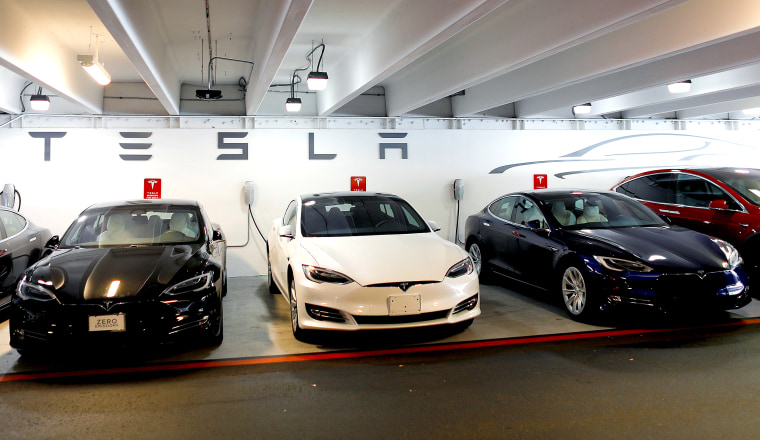Tesla is giving buyers just a few days to order one of the company’s new battery-electric vehicles and still be sure of receiving a federal tax credit of up to $7,500.
The deadline of Monday, Oct. 15, to be guaranteed delivery in time to qualify for the entire tax credit derives from rules included in the tax bill Congress passed last December.
Incentives for electrified vehicle buyers begin to phase out once an automaker has sold its 200,000 qualified vehicle. Tesla crossed that threshold in July, triggering a phase-out that will see the tax credits halved in January and eliminated entirely by the end of 2020.
That is raising the question about whether Tesla sales could lose some of their recent momentum as a flood of new battery-cars comes to market from competitors who will retain federal incentives for some time.
For now, however, Tesla sales have finally kicked into high gear with the automaker largely resolving what CEO Elon Musk had called “production hell” at its Nevada battery plant and its California assembly line. With the factory in Fremont, California, rolling out more than 6,000 vehicles a week, Tesla is racing to fulfill a backlog of initial reservations, along with new orders.

During the third quarter alone it delivered twice as many of its new Model 3 battery-sedans as it had during the first six months of 2018.
That drove total U.S. sales to nearly 70,000 vehicles for the July to September quarter, helping it leapfrog Mercedes-Benz, which delivered just under 67,000 vehicles during the same period. Tesla fell about 2,000 vehicles short of toppling the U.S. luxury market’s king-of-the-hill, BMW, and Atherton Research, which tracks trends in the auto industry, expects Tesla will snatch the sales crown during the final three months of this year.
Worldwide, the company confirmed it delivered almost 84,000 cars between July and September, “more than 80 percent of the vehicles we delivered in all of 2017.” Tesla is now looking for ways to boost overseas demand and is in the process of setting up a combined battery and assembly plant in Shanghai, though there has been some concern the project could be hindered by the ongoing trade dispute between the U.S. and China.
Closer to home, some observers are questioning what impact the upcoming loss of federal tax credits might mean for Tesla. Under the federal guidelines, though Tesla sold its 200,000 battery-car in July, buyers continue to be eligible for incentives on vehicles delivered before the end of the year. During the first half of 2019, however, the credits will be reduced to $3,750. And they will be halved again from July 1 through Dec. 31 before being eliminated entirely.
Only one other manufacturer will be facing a phase-out of incentives in the near-term. General Motors, which makes the long-range Chevrolet Bolt EV, will see its credits cut by mid-2019. Nissan, which sells the Leaf EV, will be the next manufacturer affected.
But Tesla is facing an array of new competitors launching long-range battery-electric vehicles, or BEVs, that should be able to continue offering full tax credits for some time. That includes Hyundai, Kia and Volkswagen in the mainstream, and Audi, Mercedes and Porsche in more rarefied territory.
By the end of next year there will be at least a dozen products competing with the three Tesla Model lines and most will retain their $7,500 incentives.
Initially, at least, the phase-out of the tax credits shouldn’t have much, if any, impact on Tesla, said Stephanie Brinley, a senior analyst with IHS Automotive. “People who are buying a Model 3 aren’t shopping based on price,” she said. “They simply want a Tesla.”